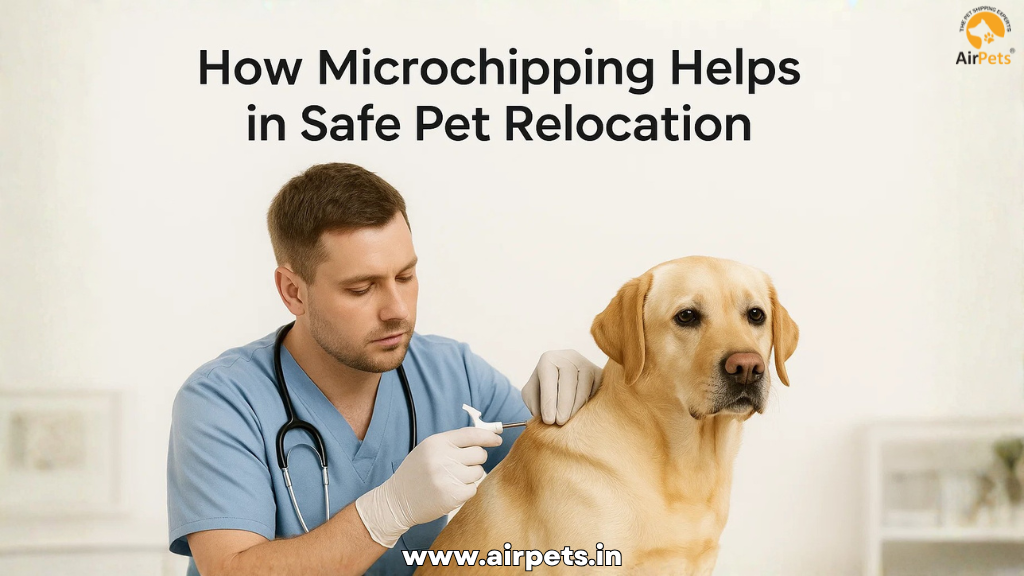Relocating a pet — whether across India or overseas — is more than just a logistical task. It’s an emotional responsibility that requires precision, documentation, and a strong commitment to the pet’s safety. Among all the steps involved, microchipping plays a vital role in keeping pets secure and traceable during travel.
Understanding What Microchipping Is and Why It Matters in Pet Relocation
Microchipping is a small but essential part of modern pet relocation. It involves inserting a tiny electronic chip, about the size of a grain of rice, under a pet’s skin—typically between the shoulder blades. This chip contains a unique 15-digit identification number linked to the pet owner’s contact and registration details.
Unlike GPS trackers, a microchip does not track real-time movement. Instead, it provides a permanent, scannable ID that confirms ownership anywhere in the world. It ensures that no matter where your pet travels, its identity remains verifiable.
Meeting International Travel Standards Through Mandatory Microchipping
In today’s global relocation ecosystem, microchipping is not optional—it’s mandatory. In every country has made it a legal requirement for pet import and export. Countries such as the United Kingdom, Australia, Canada, France, the United States, and the UAE demand verified microchip numbers before approving health certificates, vaccination documents, or import permits.
For Indian pet parents relocating overseas, the process begins with microchipping. The chip number must match across every documentation, including:
- Rabies vaccination certificates
- Fit-to-fly health certificates
- Rabies antibody titre test reports (RNATT)
- Customs and airline paperwork
Without this match, entry permissions can be delayed or even denied at the destination airport. Microchipping is the foundation of international compliance.
Ensuring Proper Identification and Reducing Errors During Transit
A pet’s journey from India to another country involves several stages—veterinary inspection, airline verification, customs clearance, and sometimes quarantine. At every step, different teams handle the pet, increasing the chance of confusion or mix-ups.
A microchip acts as the ultimate proof tool. It ensures the pet being checked or transported is indeed the right one. When scanned, the chip instantly connects to the pet’s record, confirming ownership and vaccination data. For customs and airline authorities, this verification method is the trustworthy and universally recognized form of ID.
Protecting Pets from Getting Lost or Misplaced During Long-Distance Relocation
Even in the most carefully planned relocations, pets can experience stress due to unfamiliar surroundings. Some may panic or try to escape when moved between terminals or during cargo transfers. Microchipping becomes a safety net in these moments.
In case a pet is lost or separated during travel, this chip helps to identify and return it to its rightful owner. Most international airports and quarantine centers now have microchip scanners, making quick identification and reunification possible.
It’s a safeguard no responsible pet owner should skip — especially when relocating across continents.
Simplifying Customs, Quarantine, and Health Clearance Procedures Worldwide
Microchipping doesn’t just confirm identity—it simplifies bureaucracy. Customs officials and veterinary authorities in most countries depend on the chip ID to cross-verify medical and import records. This helps shorten inspection times and prevents re-testing or re-verification at the destination.
For instance:
- Australia and New Zealand require pets to be microchipped before the rabies antibody titre test and enforce strict quarantine entry.
- The United Kingdom’s DEFRA (Department for Environment, Food and Rural Affairs) mandates that microchipping must precede vaccination.
- The EU Pet Passport System uses the chip ID as the base for all veterinary documents used in member countries.
A verified microchip smoothens the entire clearance process—reducing delays, confusion, and stress for both pet and owner.
Reinforcing Accountability and Transparency in the Relocation Process
Microchipping represents responsible ownership and professional integrity. It demonstrates that both the family and the relocation service provider value safety, traceability, and compliance over convenience.
In international pet relocation, trust matters as much as logistics. The presence of a microchip provides confidence to all stakeholders—airlines, customs authorities, and quarantine officials—that the animal’s documentation is authentic and accurate.
Understanding How Microchipping Is Done and Why It’s Safe for Pets
The microchipping process is quick, sterile, and painless. A certified veterinarian implants the chip beneath the pet’s skin using a fine needle, similar to a routine vaccination. No anesthesia is required.
Each chip is registered in a global database recognized under ISO Standard 11784/11785, making it readable by scanners across airports and animal care centres worldwide. Once implanted, it lasts a lifetime and does not harm the pet.
Pet parents can request their vet to scan the chip post-implantation to confirm successful registration and functionality.
How AirPets Relocation Services Pvt. Ltd. Incorporates Microchipping in Every Pet Journey
For families relocating pets across India or abroad, microchipping is a key part of AirPets’ pre-travel preparation. The team works with government-approved veterinarians to complete microchipping, scan verification, and record matching before health certificates are issued.
AirPets Relocation Services Pvt. Ltd., based in New Delhi, manages pet relocation from India to destinations including the USA, UK, Canada, Australia, France, and the UAE. Our methodical approach prioritizes both regulatory compliance and animal welfare, ensuring that every pet travel securely and confidently.
Summary: A Tiny Chip That Makes a Global Difference
When we talk about the pet relocation, microchipping is not just a technical step—it’s an act of care and protection. It bridges trust between families, veterinarians, and international authorities, creating a secure identity that stays with the pet for life.
Whether moving across the country or halfway around the world, a microchip ensures your pet is never without recognition, no matter where their journey takes them. In today’s connected world, this small safeguard makes all the difference between uncertainty and safety.
Also read: Air Canada Pet Travel Policy, International Pet Transport Services, Domestic Pet Transport Services in India, Pet Animal Transportation Services in India

